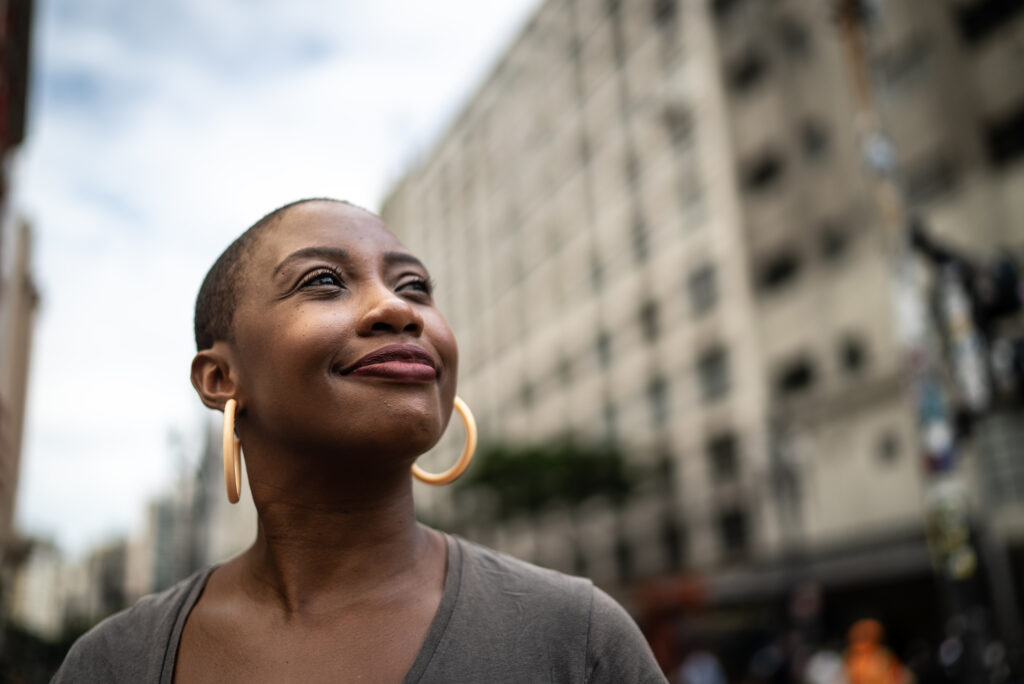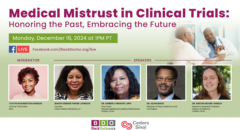
New medical treatments often come with great promise, but sometimes that promise doesn’t fully extend to Black Americans. “Populations of humans sometimes respond differently to different drugs,” said Dr. Pierre Theodore, Executive Director Health Equity at Genentech Roche, in a Facebook Live conversation on clinical trials with BDO.
“That can be sometimes because of genetic backgrounds or differences in one population versus another from a genetic perspective.” He added that “Often, it’s also the social environments and the different drivers that one population may be faced with versus another one.”
In other words, both genetics and environmental factors can cause a drug to impact one group differently than another. As Dr. Theodore noted, “We can’t even always tease apart how much of that is driven by genetics and how much of that is driven by environmental factors.”
Black women are missing from clinical trials
Ricky Fairley, a breast cancer survivor and CEO of Touch: The Black Breast Cancer Alliance, pointed to a concrete example of this problem. “We look back in history to look at the drugs that were made for breast cancer. Most of the standard of care drugs, adriamycin, taxotere, carboplatin, all the drugs that [breast cancer patients] take… Twenty to thirty years ago, there were no Black women in those trials.” This lack of representation in past clinical trials helps explain ongoing racial disparities.
Fairley highlighted that “Black women are getting breast cancer at twice the rate under the age of 35. And the statistics for Black women in breast cancer are horrible.”
Greater participation by Black Americans in clinical trials can help ensure that new treatments are safe and effective for all populations. As Dr. Theodore explained, clinical trials “allow us to understand the safety and the efficacy, that is how well does it work and how safe is it for all patients.” Without that full representation, he warned, “we may end up running into a situation where a drug impacts one population differently from another.”
Participating in Clinical Trials Provides Better Care
In addition to furthering research, participating in clinical trials can benefit patients in the here and now. As Theodore stated, “Clinical research care is a component of the best care that we have to provide to patients.” Through a clinical trial, patients can potentially access “some of the most cutting edge therapies that are available for the treatment of patients with complicated disease.”
Fairley, who has participated in five trials herself, agreed with this assessment. “You’re gonna get the best care you can get because more people are gonna be poking you and prodding you. You’re gonna have more people looking at you and checking you out. You’re gonna get more scans.”
As an example benefit, she highlighted that “If you were to start a chemo regimen today, you probably wouldn’t get a scan for 3 months to know whether was the drug was working or not. If you’re in a clinical trial, you’re probably gonna be scanned in a month.”
Overcoming Barriers Through Education and Support
While the benefits of participating in clinical trials are substantial, there remain barriers that limit involvement by Black patients. A key obstacle that Fairley’s organization identified was simply a lack of awareness—”The biggest issue frankly is that doctors don’t invite [Black patients].”
Further reflecting on this challenge, she later added that “I believe that health illiteracy is breeding health inequity. It’s breeding it because our patients just don’t know.”
To overcome this barrier, Genentech Roche and advocacy groups like TOUCH aim to educate patients while also providing enhanced support throughout the process. As Judy Lee, Senior Trial Specialist of Genentech Roche, described, their clinical trial phone line includes specially trained nurses who can answer patients’ questions and walk them through each step. Groups like TOUCH go a step further with customized navigator programs to provide targeted assistance to Black patients.
Ultimately, open communication and compassionate support can help empower Black patients to participate. Fairley compellingly concluded that for many patients, the stakes feel less scientific than personal: “It’s about another sunrise. It’s about a birthday. It’s about a grandbaby being born. It’s about a college graduation. It’s about a wedding.” By working together, doctors, researchers, and advocacy groups can ensure clinical trials translate medical advancement into more of those deeply human moments.
For more information on clinical trials, check out our Clinical Trials Resource Center.








